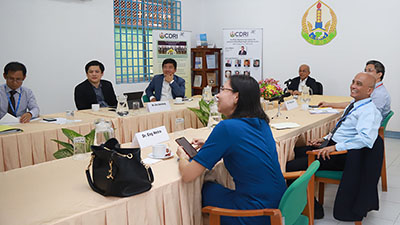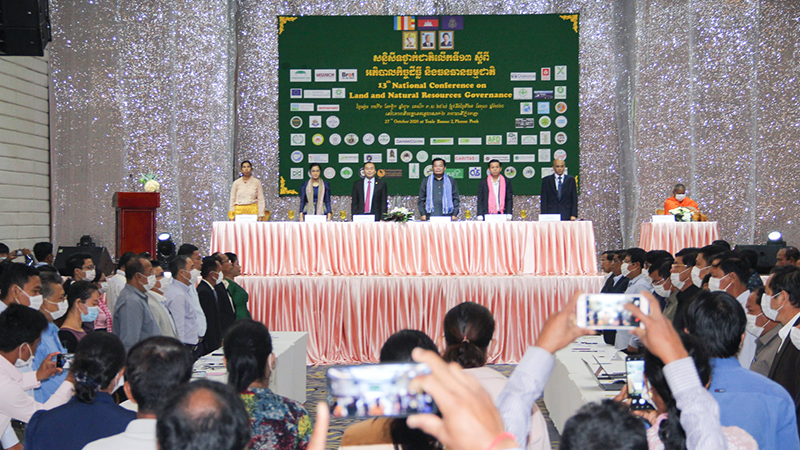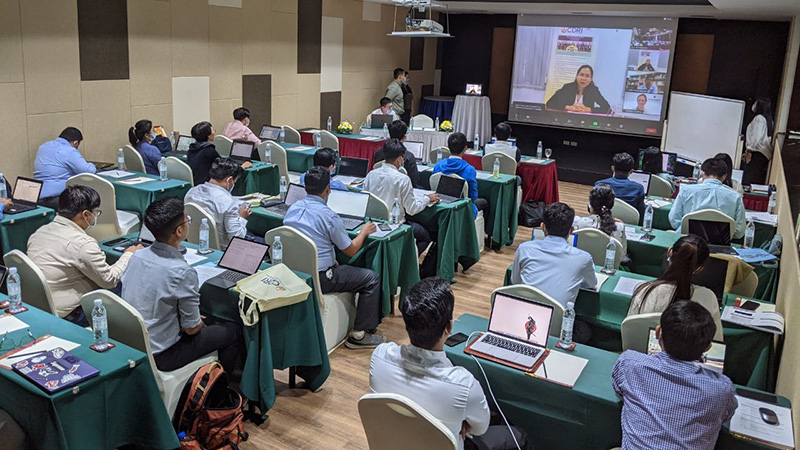
News
03 December 2024How Can Good Governance Boost Political Economy, Gender Inclusion, and Green Technology in the GMS?
How Can Good Governance Boost Political Economy, Gender Inclusion, and Green Technology in the GMS?
By Leng Molina, Winner of the Writing Contest for the 2nd CDRI Regional Symposium 2024 on Digital and Green Economy in the Greater Mekong Subregion: Governance and Gender Inclusion
The Greater Mekong Subregion (GMS) struggles with corruption, inequality, and environmental decay, but good governance offers a solution. By fostering transparency, accountability, and inclusiveness, effective governance can strengthen the political economy, boost gender inclusion, and accelerate green technology, driving sustainable development across the region.
A robust governance framework helps to establish a root for transparency, accountability, and inclusivity; it can improve the political economy; promote gender inclusion; and accelerate green technology adoption across the GMS. To effectively strengthen the inclusivity of the aspects, good governance can be leveraged through the creation of effective public policy or other mechanisms to foster sustainable growth in the region.
Since 1992, the economies of the GMS countries were under the assistance of the Asian Development Bank. The six GMS countries came together in a programme of subregional economic cooperation, established to enhance fiscal relations and growth in the region. Despite this, over three decades late, many GMS countries are still facing governance issues, leading to economic gaps and inequalities at the grassroots level.
In 2022, the Corruption Perceptions Index, conducted by Transparency International, for example, illustrated that countries within the GMS region, including Cambodia, Laos, and Myanmar, are struggling with a high level of corruption. This discourages important development aspects, including the growth of private sectors as well as the flow of foreign direct investment to the country. In this regard, the establishment of good governance frameworks, including anti-corruption plans, the reforming of legal institutions, and effective investment strategies in collaboration with other countries in the region will be a solid strategic path for GMS countries to tackle these issues.
One example that demonstrates how good governance improves and maintains socio- and macroeconomic stability is the case of Thailand. Thailand has invested in fiscal transparency and participatory national budgeting, which enable Thai citizens to know about the budget spending record of the government, participate in the budgeting process, and ensure that national funds are allocated correctly to meet the nation’s collective need.
In addition to the enhancement of the political economy, a good governance framework is crucial for promoting gender equality and inclusion, especially in areas where the community is still living with a traditional cultural norm that puts more pressure on women to uphold certain duties. A governance system that prioritised gender inclusion as a part of national and foreign policy can potentially address the systemic gender bias issue as well as raise the status of women, especially those from marginalised groups.
The creation of inclusive policies can increase more women's engagement in political participation and increase female representation in the government, which would enable participation in policy decision-making. When women receive equal opportunities, the government functions can perform with more transparency and credibility. In the case of Vietnam, the government has adopted “The National Strategy on Gender Equality of the 2021-2030 Period” aiming to narrow the gender gap in the country by raising awareness of opportunities for women to participate in politics, access education, and contribute to the growth of the nation.
Where there is a high proportion of women employed in labour-intensive industries, such as manufacturing and agriculture, framing a gender-sensitive policy framework to protect and improve the well-being of women’s labour rights, it can increase productivity and the socioeconomic well-being of women in the workforce. According to a study from the Asian Development Bank was shown that strengthening gender equality in the workforce is an important factor leading to a higher GDP and a reduction in the poverty rate across the region.
The GMS region is currently facing significant environmental challenges as well as a lack of a green technology, which threaten both socio and economic development. Green technology, which encompasses clean energy, sustainable agriculture, and pollution reduction, can address environmental issues through the creation of policies that protect ecosystems, promote climate resiliency, and manage disaster-risk with the assistance of the government and relevant stakeholders.
The governance framework that first gathered the GMS countries - the Mekong River Commission was established to facilitate the cooperation between each government to manage the river’s resources and ensure the sustainable usage of water and ecosystem conservation. These collaborations have led to a positive impact on the development of renewable energy within the region.
Additionally, in Thailand, the government has implemented a new national policy that focuses on reducing tax incentives and providing subsidies on the investment of renewable energy, aiming to encourage more investment in this sector to achieve sustainable economic growth. Other GMS countries can learn from this to create similar initiatives to support the adoption of green energy policies, reduce greenhouse emissions, transition to a low-carbon economy, and create environmental resilience.
As the GMS is in a period of rapid growth and concurrently facing various challenges, it is important that the governments of each country balance economic benefits while addressing both national and regional issues. The government of GMS should prioritise regional cooperation by establishing a shared framework, such as a cross-border initiative for environmental conservation, trade coordination, and gender equity strategy to help promote sustainable practices and harmony across the region.
Disclaimer: The views expressed in this essay are those of the writer and do not necessarily reflect the views of the Cambodia Development Resource Institute (CDRI). The writer is responsible for any unintentional errors or mistakes.



